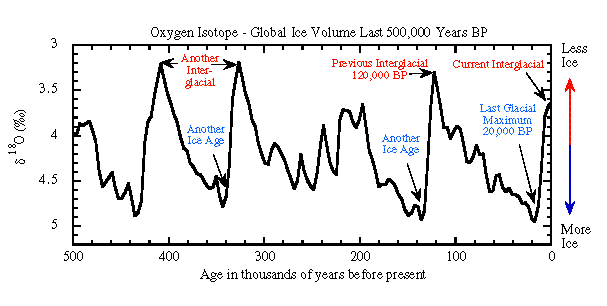@Walter Hinteler,
Refrigerators work by converting liquid into gas and back again (evaporation and condensation). That is, you are heating someone up which creates moisture and cooling effect. With a freezer, it is the same, only solid to gas.
https://www.carrier.com/residential/en/us/products/air-conditioners/how-do-air-conditioners-work/
A glacier melting creates a **** ton of cold air and cold water. This in turn converts some water from liquid to solid (i.e. more glaciers). It also creates more moisture. More moisture means less deserts, and more green usable land (in other places, there are more deserts, but this is impossible to predict).
During the ice age, we had so many glaciers that there were entire continents that no longer exist. Not all of these were lands of ice either, some were water level rising and flooding said area. The point being that people learned to survive this change, and it happened over a few thousand years.
You know what though? Those times sucked. There wasn't a great abundance of crops, the animals during this time were much more adapted to cold than us, and most importantly? There was less food and water. More glaciers means that water level lowers. Lower water level and greater cold means more deserts, barrens, and tundras. For hunters this is okay, but not for farmers or gatherers.
And yes, glaciers behave in cycles. This is what a real chart of glaciers looks like.

You notice how it kinda rises and falls? You wanna take a guess at why that is? It's because just as there is a limit to how cold things get, there is a limit to heat. When it gets too hot, a refrigeration effect results, and cold mist from melting ice caps eventually refreezes things. When it gets too cold, things dry up, and forest fires create heat. These are cycles, and they continue without any help from us.
It is incredibly narcissistic to think that we humans can create more than a minor dent in the climate. Oh yes, we can create pollution. That's not the same thing. You're basically confusing incendiaries and poison. Poison kills birds and fish, while chemicals that create heat are different. Even if we burned oil for days, by definition we would use up such chemicals, turning them into their base materials. Or do you think that under the heat of burning something like motor oil that it somehow makes it into the air intact? No, oil is constructed of long chains of carbon and hydrogen.

Heat degrades this to carbon and hydrogen in the air, which in turn becomes mostly (there is always some pollution) water as H2O and Carbon Dioxide. And some carbon monoxide.
Gasp! The level of carbon is rising! So? Usually, unless you are working with carbon monoxide (which btw, in addition to being a toxic chemical in the air, also might bond with ozone to make CO2 and O2, effectively reducing the ozone), what happens is that you take CO2 and H2O, and nearby plants make oxygen for you to breathe and sugar for them to eat.

Unless of course, you are logging in order to clear land to mind for rare earth metals to make your electric vehicles. Then you don't have enough trees to absorb heat from the sun, you don't have enough trees to create photosynthesis either. But what all of this is about is taxes.
https://www.villages-news.com/2021/06/21/climate-change-topic-is-a-scam/
Quote:The very first statement is a blatant lie regarding earth’s past temperature history. The misleading statement follows … “There is general agreement in the scientific and governmental communities that the earth has warmed to a point higher than in any period in history…”
However, the climate record clearly shows that earth’s primates developed when the earth was 10 to 15 degrees Fahrenheit warmer than today — and the earth was ice free. Carbon dating shows that the Roman Warm Period was warmer than today; and as the glaciers melt, new evidence continually comes to light indicating that the Medieval Warm Period was also warmer than today.
The entire “climate change” topic is a scam.